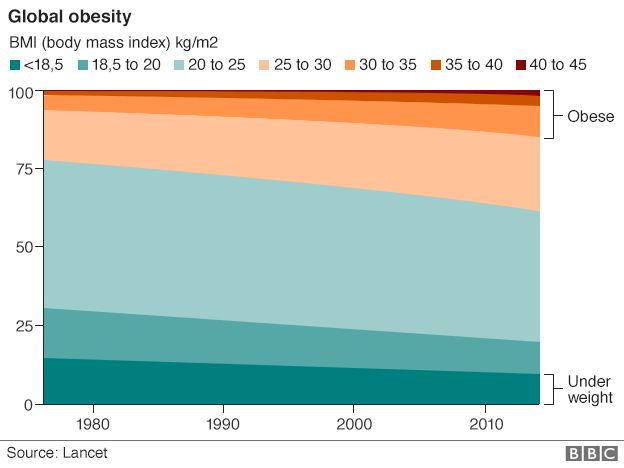
The research, led by scientists from Imperial College London and published in The Lancet, compared body mass index (BMI) among almost 20 million adult men and women from 1975 to 2014.
It found obesity in men has tripled and more than doubled in women.
Lead author Prof Majid Ezzat said it was an “epidemic of severe obesity” and urged governments to act.
The study, which pooled data from adults in 186 countries, found that the number of obese people worldwide had risen from 105 million in 1975 to 641 million in 2014.
Meanwhile the number of underweight people had risen from 330 million to 462 million over the same period.
‘Crisis point’
Global obesity rates among men went up from 3.2% in 1975 to 10.8%, while among women they rose from 6.4 % in 1975 to 14.9%.
This equates to 266 million obese men and 375 million obese women in the world in 2014, the study said.
The research also predicted that the probability of reaching the World Health Organization’s global obesity target – which aims for no rise in obesity above 2010 levels by 2025 – would be “close to zero”.

The clinical definition of obese is a BMI – a measurement that relates weight and height – of 30 kilograms per metre squared (kg/m2).
Prof Ezzati said: “Our research has shown that over 40 years we have transitioned from a world in which underweight prevalence was more than double that of obesity, to one in which more people are obese than underweight.
“Although it is reassuring that the number of underweight individuals has decreased over the last four decades, global obesity has reached crisis point.”
“We hope these findings create an imperative to shift responsibility from the individual to governments and to develop and implement policies to address obesity.
“For instance, unless we make healthy food options like fresh fruits and vegetables affordable for everyone and increase the price of unhealthy processed foods, the situation is unlikely to change.”
The research also found:
- More obese men and women now live in China and the USA than in any other country
- Women in the UK have the third highest BMI in Europe and the 10th highest for men
- Almost a fifth of the world’s obese adults – 118 million – live in only six high-income English-speaking countries – Australia, Canada, Republic of Ireland, New Zealand, UK, and the US
- By 2025, the UK is projected to have the highest levels of obese women in Europe (38%), followed by Republic of Ireland (37%) and Malta (34%)
- Being underweight remains a significant health problem in countries such as India and Bangladesh
The team also examined the number of people who are underweight, and over the same time period the study suggested the rates had fallen from 14% to 9% in men, and 15% to 10% in women.
Prof George Davey Smith from the School of Social and Community Medicine at the University of Bristol writes in the same journal of the danger of becoming “a fatter, healthier, but more unequal world”.
“A focus on obesity at the expense of recognition of the substantial remaining burden of under-nutrition threatens to divert resources away from disorders that affect the poor to those that are more likely to affect the wealthier in low income countries,” he said.

Other statistics from the study include:
- China has the largest number of obese people in the world with 43.2 million men and 46.4 million women
- The US has 41.7 million obese men and 46.1 million obese women
- In comparison in the UK the study found 6.8 million obese men in 2014, and 7.7 million obese women
Jamie Blackshaw, National lead for Obesity and Healthy Weight, Public Health England, said:
“People who are overweight and obese suffer life-changing consequences and it costs the NHS more than £6 billion a year. The causes of obesity are complex and the environment we live in encourages poor diets and low levels of physical activity.
“There is no single solution, we have to address the many factors that drive up obesity levels. We all – government, industry, local authorities and the public – have a role to play in that.
“That’s why we’re supporting the government to develop its childhood obesity strategy, we’re running the world’s first national diabetes prevention programme and we’re currently piloting, with local councils and Leeds Beckett University, a whole systems approach to tackling obesity.”
[Source:-BBC news]



